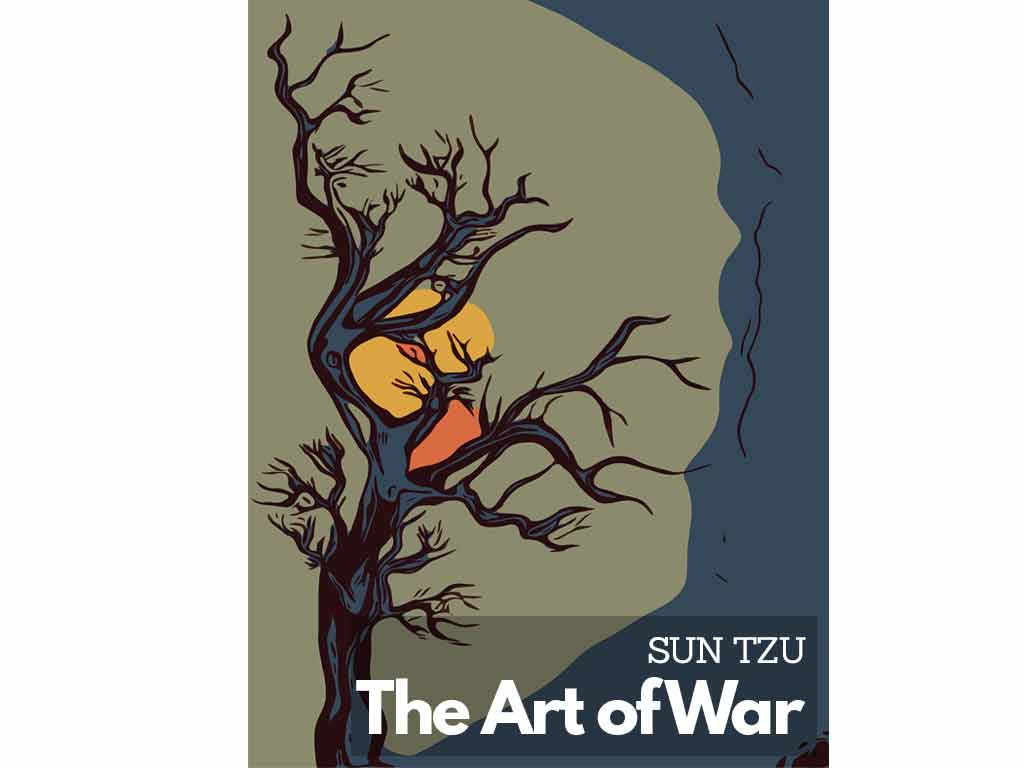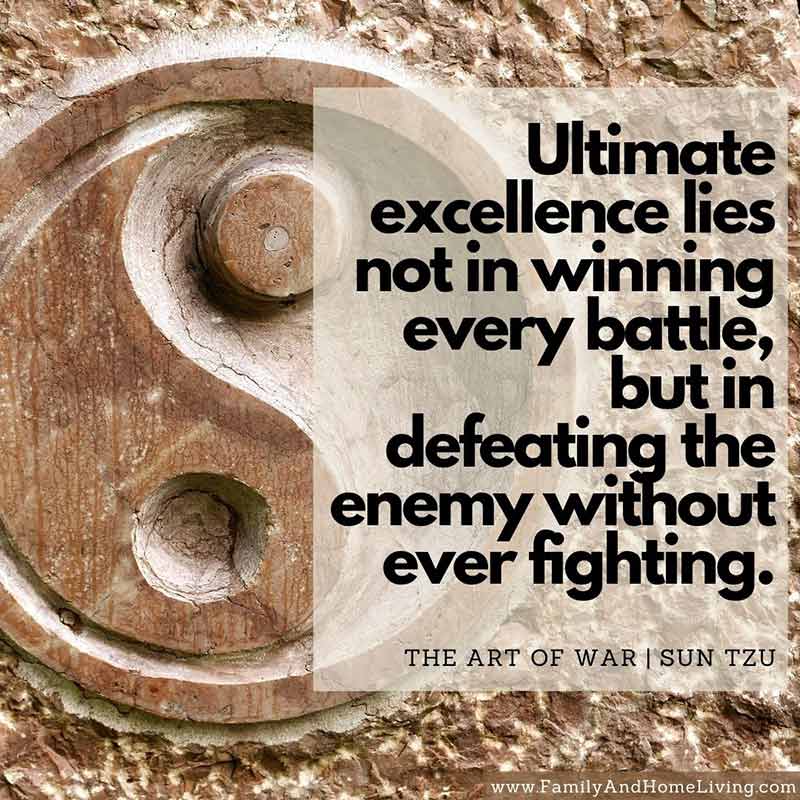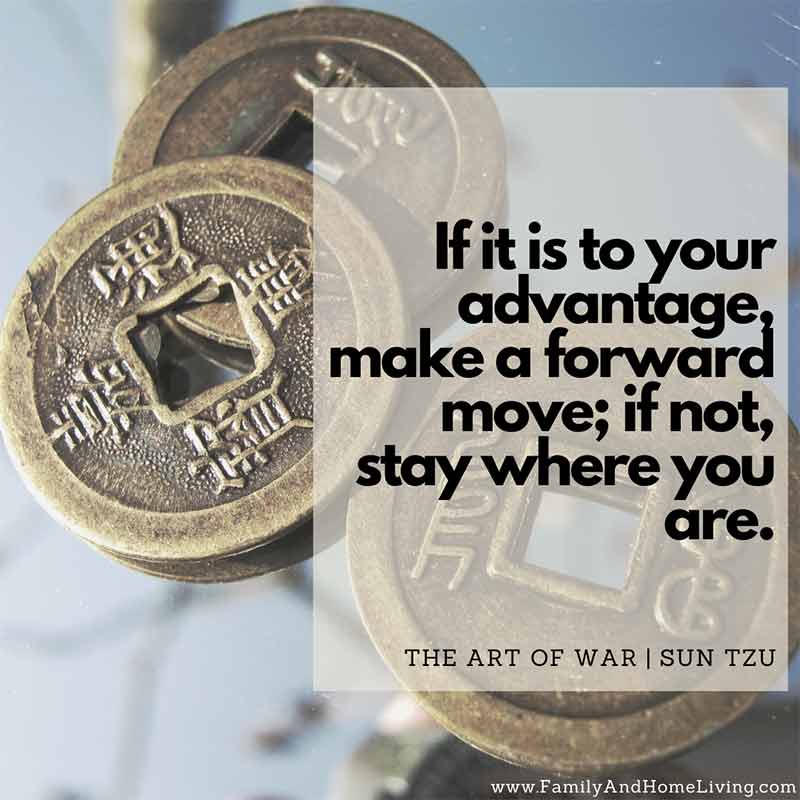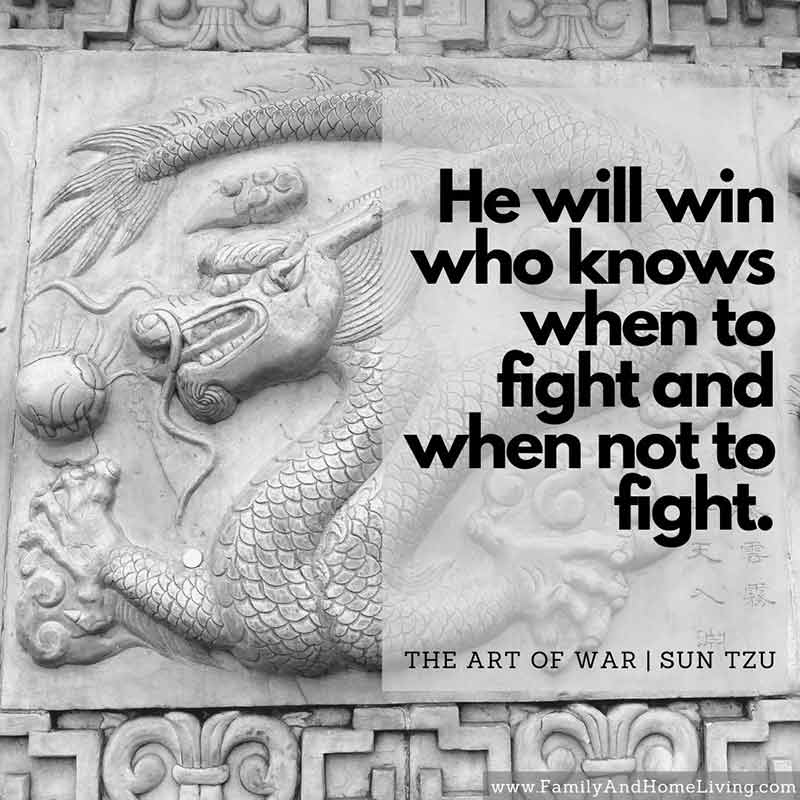This post may contain affiliate links which means we might earn a small commission if you decide to make a purchase through them (at no extra cost to you). Need more info? Click Here
The Art of War book is probably one of the most famous books ever written on strategy and planning. It is an ancient Chinese manuscript that was written by a Chinese military general and strategist by the name of Sun Tzu and it dates all the way back to about 500 BC.
Although The Art of War book was originally written from a military perspective, it also has a deep philosophical side to it which makes it extremely relevant today in everything from business to politics to sports.

Download a free copy of Sun Tzu’s, The Art of War PDF book here to learn more about Sun Tzu’s philosophies and beliefs.
The Art Of War PDF – Free Book Download
You can download your free copy of The Art of War PDF by clicking the button below. Depending on what device you are using, the PDF book will either open in a new tab or download to your device.
If you would like to download a copy of the book to your device, you can right-click the button and choose “Save As…”.
Is The Art Of War PDF Book Free To Download?
Yes, it is! The Art Of War is about 2,500 years old so it is in the public domain. You are therefore welcome to download and read it for free!
The Art Of War Summary
The Art Of War was written by Sun Tzu, who was also known as Master Sun.
It is said that after Sun Tzu successfully defended the state of Wu from the state of Chu, a hostile neighbor to the west, he wrote his book, Master Sons Military Methods. This book would later be called The Art Of War.
The book is so highly regarded that it has been used to fight battles and influence military decisions for hundreds of years.
If you know the enemy and know yourself, you need not fear the result of a hundred battles. If you know yourself but not the enemy, for every victory gained you will also suffer a defeat. If you know neither the enemy nor yourself, you will succumb in every battle.
The Art Of War
While Sun Tzu‘s book was written for war and for fighting battles he strongly emphasized that the key to true victory is not to fight at all. In The Art Of War, he emphasizes the importance of planning and preparation and that a battle’s victory or defeat is decided before the battle itself is fought. He said that with the right knowledge and planning it is possible to calculate the chances of winning before going into battle.
Ultimate excellence lies not in winning every battle, but in defeating the enemy without ever fighting.
The Art Of War
The Art Of War book is divided into 13 chapters with each chapter concentrating on specific strategies and tactics for battle.
Chapter 1 – Laying plans
Chapter 1 of The Art Of War book concentrates on the importance of planning and how it is possible to forecast victory or defeat with correct planning. Sun Tzu says that planning consists of points which he calls The Moral Law, Heavens, Earth, The Commander and Method, and Discipline. Each point is broken down as follows:
- The Moral Law – Knowing who will lead the battle and whether this leader will inspire people to follow him is extremely important.
- Heavens – Know what type of environment will you be fighting in – day or night, heat or cold, seasons and climate.
- Earth – Know the physical environment and landscape you will be fighting on – open ground vs narrow passes, the distances to be traveled, and how dangerous the landscape is.
- The Commander – Choose the correct Commander with the correct virtues.
- Method and discipline – Organise the army correctly with the correct divisions and ranks. Prepare the environment for your army, for example, preparation and maintenance of roads that are needed to easily get supplies to the army.
In this chapter, Sun Tzu also explains that war is about deceiving your enemy so they are unprepared and vulnerable.
Hence, when able to attack, we must seem unable; when using our forces, we must seem inactive; when we are near, we must make the enemy believe we are far away; when far away, we must make him believe we are near…
The Art Of War
If Your opponent is of choleric temper, seek to irritate him. Pretend to be weak, that he may grow arrogant.

Chapter 2 – Waging war
War is very costly and the whole point of going to war is to win the war. Sun Tzu emphasizes that there is no benefit to a long-drawn-out war and it is better to attack quickly if it is possible.
There is no instance of a country having benefited from prolonged warfare. In war, then, let your great object be victory, not lengthy campaigns.
The Art Of War
Chapter 3 – Attack By Stratagem
In chapter 3 Sun Tzu explains that it is always best to win a war without fighting.
Hence to fight and conquer in all your battles is not supreme excellence; supreme excellence consists in breaking the enemy’s resistance without fighting.
The Art Of War
If fighting cannot be avoided then you should conquer the enemy without destroying them.
In the practical art of war, the best thing of all is to take the enemy’s country whole and intact; to shatter and destroy it is not so good. So, too, it is better to capture an army entire than to destroy it, to capture a regiment, a detachment or a company entire than to destroy them.
The Art Of War
Sun Tzu gives 5 essentials if you want to have victory:
He will win who knows when to fight and when not to fight.
He will win who knows how to handle both superior and inferior forces.
He will win whose army is animated by the same spirit throughout all its ranks.
He will win who, prepared himself, waits to take the enemy unprepared.
He will win who has military capacity and is not interfered with by the sovereign.
The Art Of War
Chapter 4 – Tactical Dispositions
It is important to have a defensive strategy in place so that there is no possibility of defeat. Once you have a defensive strategy in place then you can bide your time and wait for the enemy to themselves give you the opportunity to strike them.
The good fighters of old first put themselves beyond the possibility of defeat, and then waited for an opportunity of defeating the enemy.
The Art Of War
To secure ourselves against defeat lies in our own hands, but the opportunity of defeating the enemy is provided by the enemy himself.
Chapter 5 – Energy
In chapter 5 of The Art of War, Sun Tzu tells us that, regardless of whether you are commanding a large or a small army, it makes no difference. Your victory will be determined by how you organize your forces.
There are just two methods of attacking your enemy – directly and indirectly. Indirect fighting methods and tactics are inexhaustible and they often are what will secure a victory. Both methods will flow into each other like a moving circle creating an endless number of combinations.
A wise commander will look at the strengths and weaknesses of his entire force rather than relying on single individuals.
The clever combatant looks to the effect of combined energy, and does not require too much from individuals. Hence his ability to pick out the right men and utilise combined energy.
The Art Of War
When he utilises combined energy, his fighting men become as it were like unto rolling logs or stones.
Chapter 6 – Weak Points And Strong
In a battle, the clever commander will make sure that he is prepared and ready. He must never be unprepared or on the back foot.
Whoever is first in the field and awaits the coming of the enemy, will be fresh for the fight; whoever is second in the field and has to hasten to battle, will arrive exhausted.
The Art OF War
Always strike where the enemy is not expecting you. Attack weak points so that the enemy is unprepared and must scramble to protect themselves. Likewise, if all your positions are defended and you don’t have weak spots your enemy won’t be able to take advantage of you.
If we wish to fight, the enemy can be forced to an engagement even though he be sheltered behind a high rampart and a deep ditch. All we need do is attack some other place that he will be obliged to relieve.
The Art Of War
If we do not wish to fight, we can prevent the enemy from engaging us even though the lines of our encampment be merely traced out on the ground. All we need do is to throw something odd and unaccountable in his way.
Sun Tzu again emphasizes the importance of knowing your enemy and planning your strategy accordingly.
Water shapes its course according to the nature of the ground over which it flows; the soldier works out his victory in relation to the foe whom he is facing.
The Art Of War

Chapter 7 – Manoeuvring
In chapter 7 of The Art of War book, Sun Tzu tells us that it is important that your army is unified and in harmony before marching into a battle. Once you have this unity you can then focus on your enemy.
Don’t march an army in areas that are unfamiliar to you. Always take advantage of local guides and spies so that you have the correct information before moving forward.
Know the mood of your enemy and attack when they are at their weakest mentally.
Now a soldier’s spirit is keenest in the morning; by noonday it has begun to flag; and in the evening, his mind is bent only on returning to camp.
A clever general, therefore, avoids an army when its spirit is keen, but attacks it when it is sluggish and inclined to return. This is the art of studying moods.
Use sights and sounds to distract your enemy.
Gongs and drums, banners and flags, are means whereby the ears and eyes of the host may be focussed on one particular point…. In night-fighting, then, make much use of signal-fires and drums, and in fighting by day, of flags and banners, as a means of influencing the ears and eyes of your army.
Chapter 8 – Variation in Tactics
This is a short chapter that summarizes the virtues of a good General and how he should change his battle strategies and tactics according to the situation he finds himself in. Sun Tzu lists 5 faults that could be a Generals undoing:
* Recklessness, which leads to destruction;
The Art Of War
* cowardice, which leads to capture;
* a hasty temper, which can be provoked by insults;
* a delicacy of honour which is sensitive to shame;
* over-solicitude for his men, which exposes him to worry and trouble.
Sun Tzu notes that when a general is captured or overthrown, you will usually find that he has at least one of these faults.
Chapter 9 – The Army On The March
In Chapter 9, Sun Tzu covers all the situations that can arise when marching with a large army. He covers things like where to camp, where and when to march and how to position yourself in every situation. He also tells you how to predict what your enemy will do using the sights and sounds around you as well as the enemy’s behavior.
Humble words and increased preparations are signs that the enemy is about to advance. Violent language and driving forward as if to the attack are signs that he will retreat.
The Art Of War
He also talks about how you should treat your own soldiers to make sure that they follow you fearlessly and with the correct state of mind.
Therefore soldiers must be treated in the first instance with humanity, but kept under control by means of iron discipline. This is a certain road to victory….
The Art Of War
If a general shows confidence in his men but always insists on his orders being obeyed, the gain will be mutual.
Chapter 10 – Terrain
Chapter 10 covers the different types of terrain an army could be faced with and how to approach each one.
The natural formation of the country is the soldier’s best ally; but a power of estimating the adversary, of controlling the forces of victory, and of shrewdly calculating difficulties, dangers and distances, constitutes the test of a great general.
The Art Of War
Sun Tzu however once again covers the aspects of psychology when it comes to your soldiers and your army.
Regard your soldiers as your children, and they will follow you into the deepest valleys; look on them as your own beloved sons, and they will stand by you even unto death.
The Art Of War
If, however, you are indulgent, but unable to make your authority felt; kind-hearted, but unable to enforce your commands; and incapable, moreover, of quelling disorder: then your soldiers must be likened to spoilt children; they are useless for any practical purpose.
Chapter 11 – The Nine Situations
In Chapter 11, The Art Of War covers different scenarios which will determine whether you should or shouldn’t fight. It is specific to the area you are going to be fighting in. For example, are fighting in your own territory? Are you cornered? Are you fighting on enemy ground? Each scenario will have different strategies that should be followed.
Sun Tzu here again goes back to the psychology of the army and how it is so important to use it to your advantage.
Carefully study the well-being of your men, and do not overtax them. Concentrate your energy and hoard your strength. Keep your army continually on the move, and devise unfathomable plans.
The Art Of War
Chapter 12 – The Attack By Fire
In this chapter, Sun Tzu covers how to use fire in attacks. Again he emphasizes how important planning is as well as knowing your own strengths and weaknesses.
Move not unless you see an advantage; use not your troops unless there is something to be gained; fight not unless the position is critical…
The Art Of War
If it is to your advantage, make a forward move; if not, stay where you are.
Chapter 13 – The Use Of Spies
In the last chapter of The Art Of War book, Sun Tzu talks about how expensive and destructive a long-drawn-out war can be. He encourages using spies to gain information about the enemy which will help you ideally avoid fighting or put you in a position where you can end a war quickly. He says that spies must be paid well so that you know that you can trust them and any costs associated with using spies will be tiny compared to a war that drags out for a long time.
Sun Tzu then gives descriptions of each type of spy and how you can use all five types to gather huge amounts of information without your enemy knowing.
Here are the 5 types of spies that Sun Tzu describes:
- Local Spies – Spies that live within the enemy’s country
- Inward Spies – Officials within the enemy’s own army
- Converted Spies – Your enemy’s spies that you have bribed to work for you
- Doomed Spies – Spies who do things openly and give false information to the enemy to deceive them.
- Surviving Spies – Those spies who safely bring back information from the enemy camp.
Sun Tzu goes on to explain how you should manage your spies so that you know that you can trust the information they bring you.
Spies cannot be usefully employed without a certain intuitive sagacity.
The Art Of War
They cannot be properly managed without benevolence and straightforwardness.
Without subtle ingenuity of mind, one cannot make certain of the truth of their reports.
Be subtle! be subtle! and use your spies for every kind of business.

How Is The Art Of War Used In Everyday Life?
The Art Of War book is just as important today as it was in Sun Tzu’s time. In fact, it is often required reading for many executives and directors in big companies today. It is even used by sports coaches, lawyers, business schools and even dating coaches! Here are a couple of tips on how to use The Art Of War in everyday life:
Know Yourself, Know Your Enemy
It is really important that you know your own strengths and weaknesses before tackling an enemy. And an enemy could be anything you face in your life. An enemy could be a bad habit, a challenging relationship, work difficulties, health problems, etc.
Choose Your Battles
Throughout The Art Of War book, Sun Tzu emphasizes the importance of knowing when to fight and when not to fight. And he says that you should never enter a battle if you don’t know you can win. It is better to wait and be prepared than to hastily go tackle something you are not ready for.
He will win who knows when to fight and when not to fight.
The Art Of War
For example, if you want to lose weight, chose the battles/habits/behaviors that are easiest to tackle or fight first. For example, don’t try to commit to running 10 miles a day when you become out of breath simply by walking up the driveway. Start with something that you absolutely know you can win at. So instead of trying to force yourself to do that 10-mile run, start with something small like walking up the street and back home again.
Likewise, instead of jumping onto the latest and greatest diet trend, start making small changes that will move you towards the bigger goal. For example, clear your cupboards of all unhealthy foods and snacks. If they aren’t there, you can’t eat them!
By starting small and choosing your battles, you put yourself in a position where you will win. And by winning you will build self-confidence. And by building self-confidence, it will be easier to tackle bigger battles in the future.
Breakdown Big Tasks Into Manageable Ones
In Art Of War, Sun Tzu tells us how to command a large army. He says that anything that seems large and overwhelming can be broken down into something smaller and much more manageable. It is a lot easier to tackle smaller tasks that will lead you to accomplish your final big task than it is to be completely overwhelmed by the thought of the big task.
Planning Is Essential
No matter what you need to tackle in your life, planning is the most important first step. Going blindly into something without a plan is the easiest way to lose a battle.
But planning isn’t enough, once you have your plan in place you need to take concrete steps toward achieving success. You must be willing to invest the time and effort needed to win the battle and achieve your goal.
By failing to prepare, you are preparing to fail.
Benjamin Franklin
Sun Tzu also talked about how important it is to plan for the worst-case scenario while at the same time expecting the best outcome. By knowing what could go wrong in a situation you are able to prepare more effectively for any outcome. And by knowing what could go wrong you won’t be caught off guard or unprepared.
Be Flexible
Life unfortunately doesn’t always go the way we plan. It is important to be flexible and adapt as obstacles and changes come our way.
Therefore, just as water retains no constant shape, so in warfare, there are no constant conditions.
The Art Of War
Learning to be flexible and change as things in your life change is an incredibly valuable skill. Learning not to give up when things get harder and seeing every challenge as a lesson to learn that will improve your life, will guide you toward achieving your goals.
The Art of War Explained in 5 Minutes
Conclusion
While The Art Of War was written from a battle perspective, it is just as relevant today as it was when Sun Tzu was alive. It teaches us how to effectively tackle everyday problems such as bad habits, difficult relationships, business challenges, etc. It is definitely a must-read for anyone who wants to take control of their life and their circumstances. Download The Art Of War PDF book free here.




